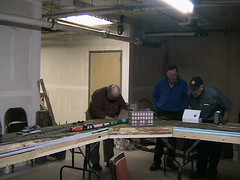TRANSPORT Minister John Watkins' new rail timetable is a failure, with on-time targets missed for afternoon peak-hour suburban trains in 40 weeks out of the 43 since its introduction.
Figures are just as bad for the financial year to June 30, with the on-time targets missed in 49 weeks out of the 52 for the afternoon peak-hour services.
The story on all CityRail lines – which include the Central Coast, South Coast, Newcastle and the Blue Mountains – is just as embarrassing, with on-time targets met in just five weeks since the timetable was introduced in September.
CityRail defines a train as on-time if it arrives within five minutes of the scheduled time, something that was supposed to be easier to achieve after Mr Watkins introduced his new timetable with fewer services that travel slower.
The organisation said its benchmark is to have 92 per cent of trains arriving on time, according to its definition of on time.

Opposition Leader Peter Debnam said yesterday Mr Watkins had shown he was unable to handle the transport portfolio.
ReplyDelete"Even after slashing services, slowing the trains and fudging the on-time figures, he still can't get the trains to run reliably," Mr Debnam said.
"It is further evidence that the State Government can't run public services. What we need is a higher standard of performance and a focus on better services for the community. What we have got from this Transport Minister is fewer, slower, more overcrowded and late trains.
The failure to reach on-time benchmarks adds to commuter complaints that journey times are longer because the new timetable requires trains to travel slower – even slower than those that ran before World War II.
For example, the trip from Hornsby via Strathfield took 52 minutes in 1938 – under the new timetable it takes 54 minutes.
The Liverpool via Granville journey took 55 minutes in 1938 compared with 62 minutes today.
Mr Watkins said at the time of the new timetable's introduction: "I have been asking commuters to be patient and I ask them to extend that tolerance for the first few weeks of the new timetable. There will be teething problems and . . . we'll work to fix them."
A spokesman for Mr Watkins said although most of the rail system went to the new timetable in September last year, several lines – including the Eastern Suburbs and South Coast lines did not change until May.
NSW Liberal Leader Peter Debnam said today despite fewer and slower trains, the Iemma Labor Government's own figures show CityRail's evening peak targets were met only five times in 2005/06.
ReplyDeleteAnalysis of the Iemma Government's figures by the Liberal/Nationals shows PM peak weekly targets were only met on five out of 52 weeks in 2005/06 for the entire network – just three out of 52 weeks for the Sydney suburban network only.
"Morris Iemma and John Watkins have fiddled the figures and they still can't get the trains to run on time," Mr Debnam said.
"Despite axing 270 services, slowing trains down to turn of the century speeds and moving the goalposts to make on-time running look better, they've still failed," he said.
"All commuters expect is a safe, comfortable and reliable service and they aren't getting this from Morris Iemma and John Watkins.
"Commuters are understandably frustrated by having their family time taken away from them by Morris Iemma's late and overcrowded trains.
"Morris Iemma and Labor have spent 12 years presiding over the rundown the train system in NSW, which has seen commuters turn their backs on public transport further clogging our already congested roads.
“Nothing runs to schedule under the Iemma Labor Government.
• OSCAR Outer Suburban Carriages initially promised for delivery in 2005 now won’t be fully in service until 2007;
• Air-conditioned carriages initially promised for delivery by 2010, now won’t be fully in service until 2012;
• North West Rail Link still 11 years away from opening and running 7 years late;
• The Rail Clearways project initially promised to cost $1.018 billion, will now cost $1.5 billion.
“The Iemma Labor Government should stop wasting taxpayers' money on blatantly political advertising and simply deliver commuters better train services and higher standards," Mr Debnam said.